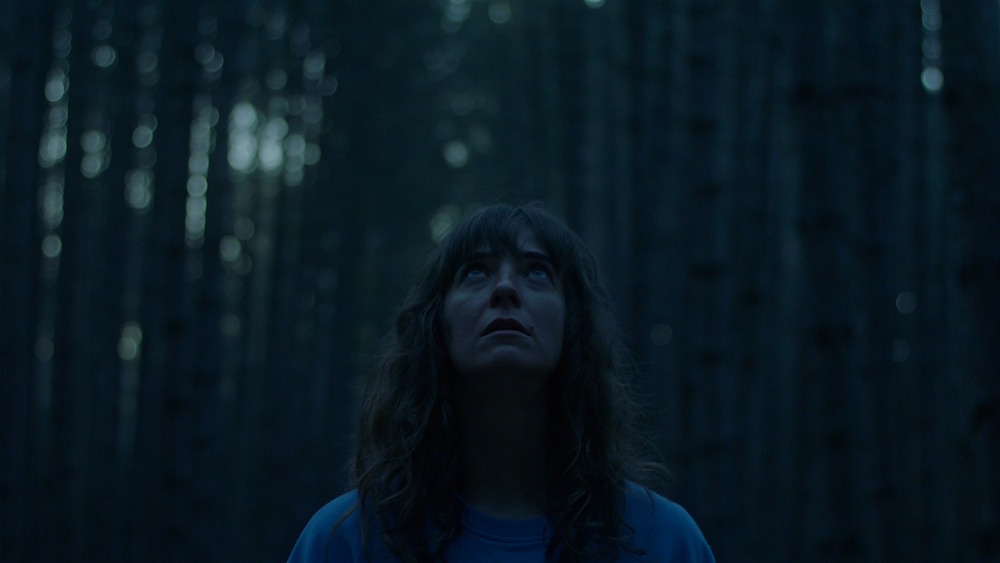With their film “Violation,” directors Madeleine Sims-Fewer and Dustin Mancinelli wanted to create a new version of the rape-revenge film, one that takes the viewer deep into a survivor’s psyche and shows how revenge only compounds their trauma. Sims-Fewer stars in the film as Miriam, who is raped by her sister’s husband, and Miriam’s childhood friend, Dylan (Jesse LaVercombe) while visiting her sister Greta (Anna Maguire). “Violation” flows through Miriam’s memories as she grapples with her trauma and confronts the harrowing reality of enacting revenge.
We spoke with Sims-Fewer and Mancinelli on Zoom about their innovative take on the rape-revenge film through their portrayal of PTSD, use of male nudity, and explicit rejection of objectifying the female body.
So [“Violation”] is part of this evolving rape-revenge cannon. Did you have any interest in those films before working on the film? Was that something that you enjoyed or were interested in?
MADELEINE SIMS-FEWER: I feel like I could never say that I enjoy a rape-revenge movie, but it was definitely something I was interested in. They’re always films that are incredibly difficult to watch and I think some of them are very problematic, but some of them are incredibly empowering. Maybe that isn’t quite the word I’m looking for, but [they] really give you that great cathartic release, especially as someone who has suffered trauma in their past. Both of us are quite open with the fact that this film is a very personal film and comes from a personal place for both of us. I think it’s definitely something we were interested in before making one.
DUSTY MANCINELLI: Yeah, I think once we knew we were going in that direction, you have to force yourself to watch all the good and the bad, so you can know what you like and don’t like, and what you want to stay away from. So we were very conscious about the construction of the film in that way. For example, just knowing right off the bat that we didn’t want to fall in the trap of over sexualizing the women in the film. We [wanted to] actually try to do the opposite and really do something new within that space.
MSF: Although there are great films that propel you towards the act of revenge, and then you feel that incredible sense of release and you’re cheering this person on, we definitely didn’t want to do that. We wanted to really see what the effect of revenge would be on a person and to see how it just completely has the potential to unravel you and compound that trauma even more.
DM: It’s almost an anti-revenge film. It’s not wanting to seek revenge, because within that genre, there’s also something really problematic about this idea of someone who’s been victimized like this can only be made whole again by killing the person who’s done this to them. That seems really like just a problematic ideology that we wanted to stay away from and instead, really focus on what are the true consequences of revenge, what it does to your morality and the relationships around you, as well as how it can really destroy the fabric of who you are.

Something that I really appreciated about this film was the representations of PTSD, because in a lot of these types of films, PTSD isn’t really addressed. I’m a sexual assault survivor and I was so excited to see that kind of haziness that comes with PTSD presented on screen. So I was just curious about how you wanted to tackle PTSD and how you wanted to represent that within “Violation”?
MSF: We really wanted to create a very visceral experience that draws the audience into Miriam’s mind so they’re experiencing the trauma that she goes through. And we really wanted to capture when you feel like you’ve gotten past something and then suddenly a sound or an image or a word, or just a facial expression of a person will bring you right back to that moment.
DM: It’s this idea of residual trauma. And I think the most important thing to us was really about experience. How do you situate the audience in a way where they really feel that disorientation, that rage, that anxiety, that claustrophobia and that the post-traumatic stress of the body. I think it was really important to us to portray the physicality of post-traumatic stress as we experienced it ourselves. And then just trying to let that be the backbone of the movie. It’s the energy of the movie.
From a more technical perspective, the film has a nonlinear narrative and utilizes a lot of flashbacks. What was that process like in terms of piecing that puzzle together?
DM: That was something we did in the script stage. It was structured around Miriam feeling betrayed by her sister and her brother-in-law, and about her emotional, psychological unraveling. So it was us trying to figure out what are the pivotal moments? You see the betrayal. Then we see a reaction to that.
MSF: We wanted the audience to feel the betrayal as she feels it. It was important to recontextualize things you’re seeing. So when you meet Miriam, you probably don’t like her that much. She’s not the most likable person. She’s a normal person with lots of flaws and she does a lot of things wrong. We wanted to introduce [Dylan] as very warm and affable and loving and kind, and fun. So when there is that betrayal, we’re also betrayed.
DM: We feel it as an audience. And it’s also really something true to our experience within the rape-revenge genre. While it does happen, you’re just so used to seeing the stranger in the alleyway, the nefarious felon. But from our experiences and speaking to a lot of other people, it’s far more common to happen by someone that you trust, someone that was close to you. We wanted to structure the film in a way that really forces the audience to recontextualize who they think they know. So hopefully the audience is really challenged in the same way that Miriam is challenged by the betrayal.
One thing I wanted to ask about was the use of very explicit male nudity during the revenge scene. You often see women objectified and their body as a spectacle. What was the decision-making process in showing that explicit male nudity, combined with the really explicit dialogue between Miriam and Dylan, that is very much stripped of any kind of sexuality?
MSF: No one’s asked about the dialogue in that scene. A lot of people obviously have asked about the nudity because it’s so shocking. Even though we have seen explicit male nudity on camera before, the fact that he’s in this vulnerable position, he’s being undressed by a woman who is fully clothed and the lack of sexuality in the scene is what shocks people.
But what we were going for with the dialogue there is that Miriam is posing questions to him and she’s trying to work out his motivations, how he saw things ,and how he felt about what he did. And he doesn’t pick up on what is happening. He’s on one level and she’s on a completely different level. She’s trying to work out whether she can get past this or what she’s going to do, whether she’s going to go through with her plan or not. So on one level this is highly charged sexual dialogue between them. But then on another level, it’s a test.
DM: Honestly it is a good representation of just how he is not able to read her cues because there’s a couple moments very clearly where she [isn’t consenting]. She’s not really on board the way he thinks she is, but he’s not able to see it. And that then later is revealed, in the scene by the fire. I think there’s also just something really interesting to us about how some audiences reacted to the full frontal male nudity. It’s shocking to us how some men have been really incensed by it. And again, I think it’s like what Madeleine said. I think it’s because when something violent happens to him, he’s incredibly vulnerable and she has all the power in the scene. She’s also not being sexualized which seems to be really upsetting for some people. It’s so crazy because within this genre, we’re so used to seeing the opposite.
MSF: Female rage is portrayed with sexy badass women and that’s fine, but where are the other interpretations? Where’s just a woman who’s angry who doesn’t also have to be sexy?

She was wearing mom jeans and Keds, which is an outfit that I would wear.
DM: Someone made the comment that she’s wearing a mom outfit. It’s just crazy to me that there’s this weird double standard happening here. She has to be sexualized or she has to be dressed sexy for this to be palatable.
I bet it makes people uncomfortable because it feels so much more real. Rape revenge often has this fantastical feel, with bright colors, girls in bikinis, and men with greasy abs. But the reality of revenge is it’s going to be done by normal-looking people. That’s so crucial in this genre, especially because it is so built on spectacle and like you use that idea of spectacle.
MSF: The underpinning for the whole film for us was naturalism above everything. We just wanted everything to feel so grounded. We made the movie for a tiny amount of money and we couldn’t have done it without the special effects artists who we worked with, Tonio Shaki, who is an incredible artist. We knew that the special effects had to be so grounded. We didn’t want it to feel like you’re looking at “Hostel”-type special effects. Not that they’re bad, it’s just a very specific type where you’re aware as the audience, you’re not looking at real people anymore. So Shaki on board and just allowed us to create what they created this full body model of Jesse LaVercombe. It was indistinguishable from him.
DM: Yeah, it was pretty crazy. Even when you see the feet being pulled up, those aren’t real feet. It’s literally hand-painted.
I wanted to talk about the scene where Miriam, after her assault, comes into the bedroom with her husband and then almost sexually assaults him. I just wanted to hear more from you about the inclusion of that scene, as well as the navigation of sexuality after assault. Male sexual assault is not seen on screen very often.
MSF: There were two reasons it was in there. Firstly, so often we see women who are sexually assaulted that become frigid. And while of course that is a response by some people, it’s not the response by all people. There are instances where you try to reclaim your sexuality and you try to find that connection through sex. We really wanted to explore that. We also wanted to show how she is oblivious to what she’s doing, especially after her own trauma, even though she is enacting harm on her partner.
“Violation” will be available on Shudder on March 25.











